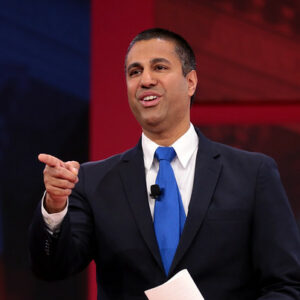As the Federal Communications Commission prepares a vote on imposing “net neutrality” regulations on the internet, opponents warn the policy will stifle innovation that has led to lower prices and faster speeds for web surfers.
“The internet has not just survived but thrived without these rules,” former FCC chairman Ajit Pai told InsideSources. “Remember how their hysterical predictions on this issue over half a decade ago never came true? Most normal people do, and that’s why they don’t care about this issue.”
It’s not an abstract issue to Pai, who oversaw the vote to repeal net neutrality rules imposed by the Obama administration. In 2018, a California man was arrested after threatening to kill Pai’s family in retaliation for the vote, a sign of how heated the debate became over ending the net neutrality rules.
The Biden-appointed majority on the FCC is expected to undo the light-touch regulations of the Ajit Pai era and instead reclassify internet service providers from information services to common carriers, resulting in a more strict regulatory approach.
“The new regulatory regime would significantly hinder the proliferation of emerging technologies geared to connect consumers online,” Nathan Leamer of Fixed Gear Strategies told InsideSources.
Opponents of net neutrality say the wireless world’s track record without the regulations proves there’s no need to reinstate them.
Internet speeds have increased exponentially during the past seven years. In 2017, the average download speed was 30.74 megabits per second (Mbps). By 2020, it was 89.83 Mbps. Last year, it was between 119 Mbps and 138.9 Mbps. It could be close to 100 gigabits per second by 2050.
Despite a lack of government regulation—or perhaps because of it—those increased speeds were accompanied by a drop in prices. The FCC reported in February that internet service prices dropped 19 percent between 2009 and 2023 before being adjusted for inflation. For those who use mobile phones to surf the web, service prices dropped 45 percent during the same period when inflation isn’t considered.
A key concern of net neutrality supporters is that ISPs could choose to prioritize content from some sources and throttle content coming from others.
“Your ISP’s job is to deliver the data you asked for, not the data they wish you’d asked for,” said Cory Doctorow, an author and special adviser for the Electronic Frontier Foundation.
In his view, net neutrality is “the straightforward proposition that if you request some data, your ISP should send it to you as quickly and reliably as it can. Instead, ISPs want to offer ‘slow lanes’ where they will relegate the whole internet, except for those companies that bribe the ISP to be delivered at normal speed.”
The FCC originally approved net neutrality during the Obama administration in 2015. Two years later, it reversed course under Donald Trump.
President Joe Biden vowed to reinstate net neutrality in 2021. That push was stymied until last year when Democrats gained a 3-2 majority on the FCC Board of Commissioners.
Supporters used the COVID pandemic as proof that high-speed internet is essential for all Americans. During an April 3 announcement, FCC Chair Jessica Rosenworcel said the only way for her agency to be a “strong consumer advocate” for an open World Wide Web is for the return of net neutrality.
Her predecessor scoffed at her claims.
“This entire subject is a waste of time,” Pai said. “ISPs don’t block or throttle content, engage in anticompetitive prioritization, and the like, so net neutrality regulations don’t matter.”
What concerns Pai and other net neutrality opponents is that the issue could become a political tennis match. Should Donald Trump win this year’s presidential election, then net neutrality would likely be repealed.
“[It’s] a reality that this is a longstanding issue that has lasted several decades,” admitted Leamer.
But Doctorow dismissed the idea. “That’s not how the administrative procedures act works,” he said. Doctorow accused the Trump administration of breaking the law by reversing net neutrality. “The only reason that [Pai’s decision] wasn’t overturned by a lawsuit is that it was easier to overturn it just by changing the policy again. So if future administrations are law-abiding, then the policy won’t change.”
Congress could also get involved through the legislative process, but it’s unlikely given its deep division and struggle to pass spending bills.
In Pai’s opinion, the government should leave the internet alone.
“Whether or not legislation passes, Americans would be better off without FCC micromanagement of the internet–period.”
The FCC net neutrality vote is scheduled for April 25, when the Democratic majority is expected to pass it.


